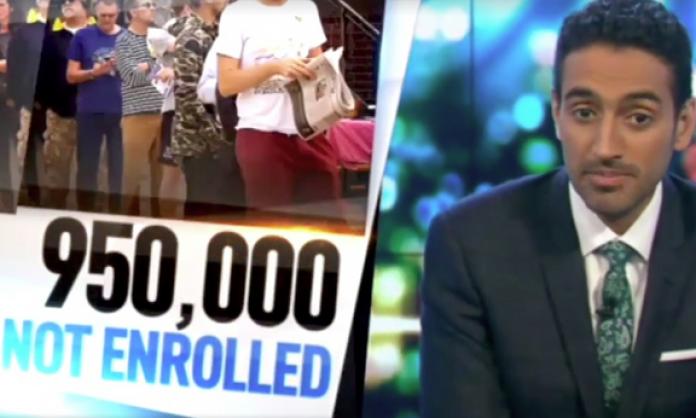There is a problem with Australian democracy.
It’s probably you – especially if you’re young.
By every possible means – emails from unions, the Greens and ALP, stalls staffed by erstwhile student activists on campus, Waleed Aly’s impassioned plea on The Project – the call to enrol to vote reached a crescendo on Monday, 23 May, the last day you could get on the roll for the 2 July election.
The Australian Electoral Commission estimates that around 950,000 eligible voters are not enrolled, including about half of 18-year-olds (about 130,000 people). A quarter of voters aged 18 to 24 are thought not to be enrolled.
Waleed Aly dubs them the “democracy resisters”. His implication is clear: what is the matter with you people?
Now, I agree that people should enrol, for the very good reason that no-one should deny themselves the pleasure of putting the Liberals last. Let’s make the most of the few minutes of democracy that capitalism allows us, and kick out Turnbull and his cronies.
But if voting in Australian elections has so much to offer, why are there so many unenrolled young people?
Waleed Aly reckons he gets it: “You’re made to feel dumb and lazy and inexperienced when you ask questions or voice an opinion”.
Similarly, those promoting themselves as the voice of a new generation, such as the 19-year-olds who set up Enrol 4 Change, say: “As people from older generations dominate Australian politics, it can be difficult for young people to actively connect with political issues”.
If the generation gap is the problem, perhaps those selfies, Game of Thrones references and photos of themselves as fresh-faced young students that are being trotted out by politicians on social media are the way to go after all.
No-one seems willing to say the obvious thing: that having something worth voting for would have solved this problem very easily.
As the Bernie Sanders campaign in the US has shown, young people in the 21st century are not inherently disengaged. By March this year, the 74-year-old Sanders had won more votes of people under 30 than Clinton and Trump combined. Tens of thousands continue to show up at his campaign rallies because his rhetoric connects with their concerns about a world run for Wall Street, in which the cost of living, jobs and student debt are an ever present threat to everyone else.
It’s not like it’s hard to find out what interests most young people in Australia. The think tank Australia Institute in 2013 found that the top three issues that most affected how those aged 18 to 25 will vote are jobs, housing and university funding.
Of those surveyed, 51 percent ranked jobs for young people in their top five issues at the election. Rent was a key issue for 47 percent. In addition, almost half of those aged under 25 believed no party represented their interests. I doubt that much has changed in the intervening three years.
The entire political system is geared towards the interests of the wealthy, and the election isn’t going to change that. Instead, young people are promised (at best) more of the same: continued high student fees, 12 percent (official) youth unemployment, erosion of penalty rates, starvation levels of the dole accompanied by non-stop harassment by Centrelink, high rents and no chance for most of buying a place to live because the price of housing has been driven sky high by tax concessions to landlords.
The politicians don’t inspire confidence. From “Mr Harbourside Mansion” Malcolm Turnbull to the difficulties that employing live-in nannies have caused Greens leader Richard Di Natale, what is there to make us think any of them care about people like us?
We’re still five weeks away from polling and already the ALP has backed down on reversing the pension assets test and restoring the school kids bonus because they are “unaffordable”. For whom?
We need a fighting alternative that stands against the priorities of capitalism that make people’s lives insecure and miserable. The longer politics remains merely a choice of which party will implement austerity, the more voter disengagement will remain high.









